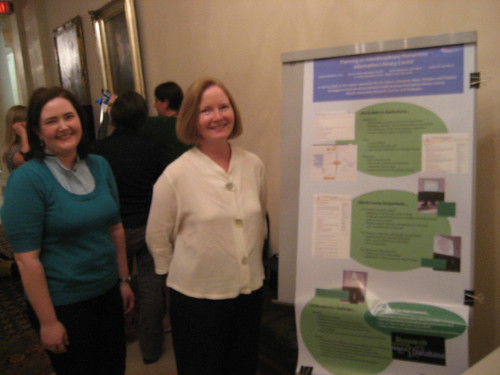This article is more than 5 years old.
On May 20th, a beautiful North Carolina afternoon, Ellen Daugman, Kaeley McMahan and Craig Fansler traveled to UNC-Chapel Hill’s Wilson Library to present posters in the LAUNCH-CH Research Forum. The Forum is made up of 2 hour-long poster sessions sandwiched around a paper presentation by three presenters. The poster sessions were arranged along a corridor in the library, where presenters arranged their posters, computers and handouts on tables and easels. An electronic version of each of our posters is viewable at: http://www.lib.unc.edu/launcch/forum/
Poster Sessions:

“From Start to Finish: Planning an Interdisciplinary Information Literacy Course” was presented by Ellen Daugman and Kaeley McMahan. The poster outlined the steps we took during the planning of our LIB250 course, what we taught during the course, and what improvements we plan to make for the next time the course is taught. We had great questions from the attendees and gave out lots of handouts. Leslie’s mindmaps were a big hit again!
“The Library in the Classroom” was presented by Craig Fansler. The poster described the process of introducing exhibit projects into classes at Wake Forest. The poster visualized the exhibit design process from idea to finished project through photos and text. There were also handouts which are given to WFU students doing these projects and a rotating Powerpoint with images of students working on each stage of their exhibits. All the comments were very positive and encouraging and it was terrific to network with a group of librarians from across North Carolina.
Paper Presentations:
Each paper presentation at the LAUNCH-CH Research Forum in Chapel Hill on May 20 was heralded as, “And now, for something completely different!” As they indeed all were. I’ll be summarizing the presentation of a unique program underway at one of the branches of the Public Library of Charlotte & Mecklenburg County. Kaeley and Craig will each cover one of the other two presentations.
“Programming for Children with Special Needs and their Families in a Public Library”
Tricia Twarogowski, Children’s Services Manager at the Matthews Branch Libray of the PLCMC, described an innovative and need-specific approach to storytelling which she has initiated, in her talk entitled, “Programming for Children with Special Needs and their Families in a Public Library.” It all began in August 2008 when some parents expressed their wishes for library programs that could readily accommodate their special needs children, many of whom are autistic or have Down’s Syndrome. Tricia responded with a questionnaire about these children’s likes and dislikes and a focus group in September 2008, which posed queries regarding what an effective program would be like, tips for interacting well with their children, what resources the library needs, and what challenges they face when they come to the library with their children. In addition, she established a partnership with the Autism Society of North Carolina, attending their meetings, and also with the Allegro Foundation which works with children with disabilities. Avoiding any indication of special needs, the program is listed simply as “Rhythm and Rhyme: a storytime for special needs children and their families.
Children are allowed to roam freely during storytime, or can cuddle with soft pillows and animals. Librarians alternate between sitting in the middle of the group or walking around (in response to contradictory preference feedback). Parents, she said, are more supportive than those in other story groups both in terms of their own children as well as with other children and the librarians. Often children interact in ways other than they normally do with other children, and parents have described the time as additional therapy, sometimes tearfully watching their children blossom in their encounters with their storytime peers. Parents who normally head immediately to the back of the room with their autistic children, admitting to Tricia that they always need to know the nearest and quickest exit, now feel free to approach the center of activity and engagement. There has been local press coverage, and Tricia looks to the future to strengthen partnerships, to modify some aspects based on feedback and experience, and to extend programs through additional PLCMC branches. It was an impassioned and engaging presentation, and one librarian in the audience who has an autistic child testified to the merit of such a program.
Kaeley, Craig, and I enjoyed the time presenting our posters before and after the talks. Numerous people took the time to browse through the variegated assortment filling the hallway of the Wilson Library (Special Collections) and stopped to talk with us about our experiences with developing and teaching an Information Literacy course in the Humanities. -Ellen Daugman
“The Effect of Library Instruction on Undergraduate Library Use”
“The Effect of Library Instruction on Undergraduate Library Use” was presented by Katherine Knott, who wrote the study for her master’s project at UNC-CH. She wanted to study the effect of a one-shot library instruction session on students’ use of the library. She gave an initial survey to 300 students in English 101 and 102 courses before their library session for the course, then gave a follow-up survey a few weeks after the session. There was a control group of 250 students who did not have a library session. The survey consisted of six questions and measured how the students did or did not use the library (students were given multiple choice responses):
1)How many times have you physically entered the library?
2)On average, how long did you stay in the library?
3)What did you use the library for?
4)Where do you do most of your studying and classwork?
5)(She didn’t discuss, wasn’t on her slides)
6)Where do you do most of your research?
The survey results showed that while the number of student visits to the library increased after a library session, the length of time spent in the building actually decreased. She thought this might be because students actually knew how to use the building and how to locate what they were looking for and thus used the resources more efficiently than those who didn’t have a library session. Also, she found an increase in the number of students who used the library as a place to study after their library session, though the preferred place for studying and research remained the students’ dorm or apartment.
-Kaeley McMahan
“Going Global with Information Literacy” was presented by Angela Whitehurst, Distance Education Coordinator at the Joyner Library at East Carolina University. Angela began working with an anthropology class at ECU who was part of their Global Academic Initiatives Program. As a result of the economic climate, ECU experienced impediments to international travel but still wanted to capture a study abroad experience. The Global Academic Initiatives Program has two components: a Global Understanding Course and an International Lecture Exchange. The Global Understanding Course covers multiple disciplines and has 23 partner institutions in 18 countries who link to and chat with partners who also conduct research. The library and information literacy component of this is to pose concepts, find weaknesses, and build each course accordingly. The questions involve finding out:
•What knowledge do students have about the availability and use of country resources when entering the course?
•Would providing instruction to students related to their field increase their information literacy skills?
•Would the quality of student assignments improve after information literacy instruction?
•Would instruction using country/cultural resources be a useful avenue for libraries attempting to integrate information literacy instruction into a globalized curriculum?
The methodology used for this program was to train the faculty first, and then using a pre-test/post-test for students information literacy skills. The tests covered choosing appropriate resources, evaluating resources, and using citations.
Ms. Whitehurst stated that the results of this program were mixed, but that they were encouraged by increases in usage, identification and evaluation of source materials as well as positive feedback.
-Craig Fansler


1 Comment on ‘LAUNCH-CH Research Forum, May 20, 2009’
Great job, all!